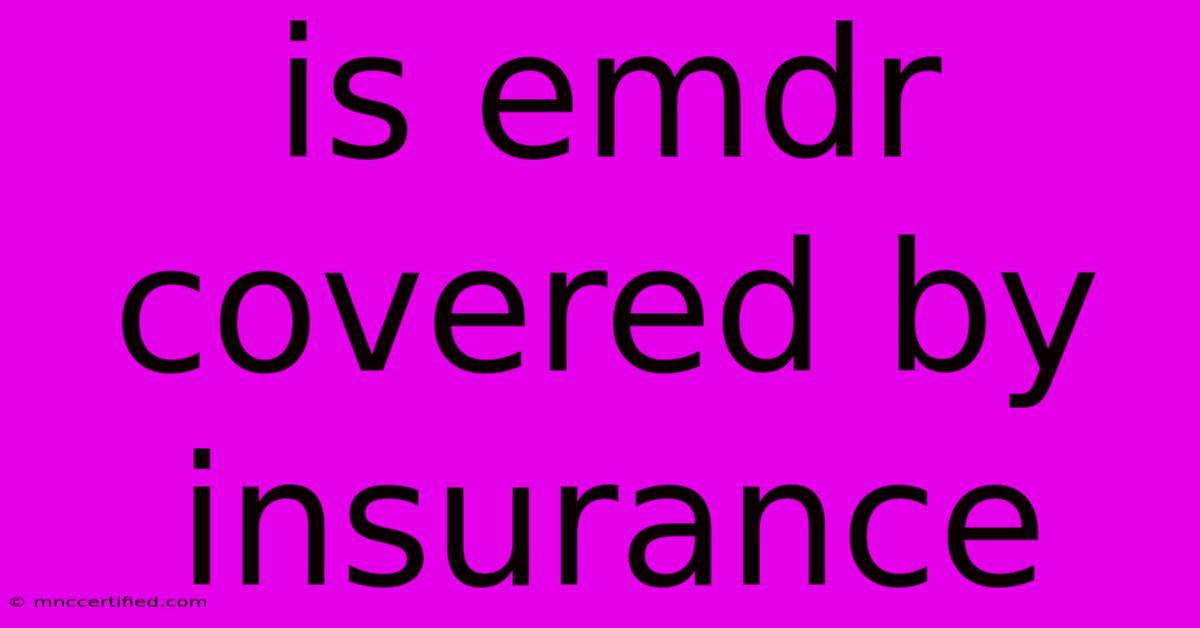Is Emdr Covered By Insurance

Table of Contents
Is EMDR Therapy Covered by Insurance? A Comprehensive Guide
Eye Movement Desensitization and Reprocessing (EMDR) therapy is a powerful treatment for trauma and other mental health conditions. But a common question many potential clients have is: Is EMDR covered by insurance? The answer, unfortunately, isn't a simple yes or no. Coverage varies significantly depending on several factors. This comprehensive guide will help you navigate the complexities of insurance coverage for EMDR therapy.
Factors Affecting EMDR Insurance Coverage
Several key factors determine whether your insurance plan will cover EMDR therapy:
-
Your Insurance Provider: Different insurance companies have different policies. Some may fully cover EMDR, others may partially cover it, and some may not cover it at all. Check your specific plan's benefits document – this is the most accurate source of information. Keywords to search within your plan documents include "mental health," "outpatient therapy," "evidence-based therapies," and "EMDR."
-
Your Plan's Benefits: Even if your insurance provider lists mental health coverage, the specifics matter. Look for details on:
- Session limits: How many therapy sessions are covered per year?
- Out-of-network coverage: Will your plan cover EMDR if your therapist isn't in their network? Out-of-network coverage usually offers lower reimbursement rates.
- Pre-authorization requirements: Does your plan require you to obtain pre-authorization before starting EMDR therapy? This is a common hurdle.
-
Your Therapist's Credentials: Many insurance providers only cover EMDR therapy provided by licensed mental health professionals who have completed specialized EMDR training and certification. Ensure your therapist is EMDRIA (Eye Movement Desensitization and Reprocessing International Association) approved; this often increases the likelihood of coverage.
-
Your Diagnosis: The specific diagnosis for which you're seeking EMDR therapy can also influence coverage. Some conditions, like PTSD, are more frequently covered than others. It's crucial to provide your therapist with accurate information for proper diagnosis and claim submission.
-
Location: Geographical location can play a role, as state regulations and insurance market dynamics vary.
How to Determine Your Coverage
Here's a step-by-step process to determine if your insurance covers EMDR therapy:
-
Contact your insurance provider directly: This is the most reliable method. Call their customer service line or review your policy documents online. Be prepared to provide your policy number and ask specific questions about EMDR therapy coverage, including pre-authorization requirements. Use keywords like "EMDR therapy," "trauma therapy," and "mental health services."
-
Check your therapist's insurance panels: Your therapist may have a list of insurance companies they're in-network with. Ask them directly if they accept your insurance plan and what the process is for billing.
-
Ask your therapist about pre-authorization: If pre-authorization is required, your therapist will likely guide you through the process. This usually involves providing documentation supporting the medical necessity of EMDR.
What to Do If EMDR Isn't Covered
If your insurance doesn't cover EMDR, don't despair. Several options exist:
- Explore options for reduced fees: Some therapists offer sliding-scale fees based on income.
- Negotiate a payment plan: Discuss payment options with your therapist.
- Seek out financial assistance programs: Look into mental health charities or other organizations that offer financial aid for therapy.
- Consider alternative therapies: Explore other evidence-based treatments that address similar concerns and may be covered by your insurance.
Successfully Navigating EMDR Insurance Coverage
Finding out whether your insurance covers EMDR therapy requires proactive research and clear communication. By understanding the factors that influence coverage and following the steps outlined above, you can increase your chances of accessing this effective treatment. Remember to always verify information directly with your insurance provider and your therapist. Proactive communication is key to a successful journey toward better mental health.

Thank you for visiting our website wich cover about Is Emdr Covered By Insurance. We hope the information provided has been useful to you. Feel free to contact us if you have any questions or need further assistance. See you next time and dont miss to bookmark.
Featured Posts
-
Fa Cup Live Stream Guide
Nov 30, 2024
-
Ninja Data Nyse Tick Symbols
Nov 30, 2024
-
Inspiring Leadership The Kelce Way
Nov 30, 2024
-
Crypto Engine Pro Blog Legit
Nov 30, 2024
-
Celtics Month Long Wait County Matchday
Nov 30, 2024